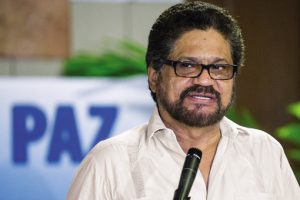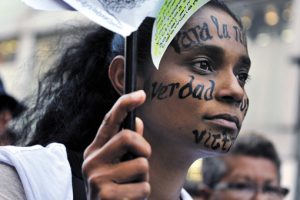Venezuelan Opposition Leader Charged with Conspiracy
The Venezuelan state prosecutor’s office formally charged former Congresswoman Maria Corina Machado with treason and conspiracy for allegedly plotting to kill President Nicolas Maduro this Wednesday. The indictment comes after a chain of emails plotting to start a coup to overthrow the Maduro administration surfaced in May, allegedly between U.S. officials and Machado, an opposition … Read more
UN Climate Change Delegates Under Pressure to Reach Consensus
On assuming the presidency of the 20th Conference of Parties (COP20) annual climate change conference in Lima on Monday, Peruvian Minister of the Environment Manuel Pulgar-Vidal reminded delegates from 194 countries that they should seize the opportunity to reach a global consensus to reduce emissions ahead of next year’s Paris agreement. “Never has it been … Read more
Government Announces Agreement to Combat Illegal Mining in Cauca
The Colombian government announced on Monday initial agreements to combat illegal mining in Cauca province, four days after Afro-Colombian women from the region took over the Interior Ministry to protest illegal mining operations in their communities. In recent years, there has been an increase in illegal gold mining in Cauca, which is controlled by gangs … Read more
Monday Memo: Peru COP20 — Uruguay Election — Colombia Peace Talks — Venezuela Oil — Cuba GDP
This week’s likely top stories: Global leaders gather in Lima for the COP20 Climate Summit; Tabaré Vázquez wins the runoff presidential election in Uruguay; With FARC hostages released, Colombian peace talks are set to resume in Havana; Venezuela braces for impact as oil prices hit rock bottom; Cuba misses the mark on economic growth in … Read more
FARC Releases Two Hostages in Colombia
FARC delegates in Havana released two hostages today in an apparent effort to revive peace talks suspended since last week. The two soldiers, Paulo César Rivera and Jonathan Andrés Díaz, were captured on November 9 in Arauca department and were released to the Colombian army this morning. The FARC has said that it plans to … Read more
Colombia: La paz y los militares
Aunque los cálculos políticos y militares anunciaban una pronta liberación del general del Ejército Rubén Darío Alzate Mora, secuestrado por las FARC en el Chocó, el hecho que provocó la suspensión del proceso de paz entre el gobierno colombiano y esa guerrilla por primera vez en dos años de diálogo, todavía lo tiene en vilo. … Read more
Colombian Soccer Team Blacklisted for Money Laundering
The United States Treasury accused Medellin-based soccer club Envigado of laundering money for a drug trafficking group this Wednesday. According to the Treasury’s Office of Foreign Assets Control, the soccer club, owned by Juan Pablo Upegui Gallego, worked together with the crime syndicate Oficina de Envigado to cover up drug trafficking money through the club’s … Read more
Venezuelan Opposition Leader Denied Release
Leopoldo López, a Venezuelan opposition leader and founder of the Voluntad Popular (Popular Will) party, appeared in court on Tuesday for the first time since the UN Working Group on Arbitrary Detention (WGAD) found his detention illegal and called for his immediate release on October 9. He had refused to appear until presiding judge Susana Barreiro ruled on the recommendation. … Read more
Monday Memo: Colombia Peace Talks — U.S. Refugee Status — Petrobras Arrests — Cuba Tourism — Pemex Investments
This week’s likely top stories: Colombia’s peace talks suspended over kidnapping; U.S. will grant refugee status to select minors from Central America; Brazilian police arrest 27 in Petrobras corruption scandal; Cruise ship tourism is booming in Cuba; Pemex invests millions in hydrocarbon production and exploration. Kidnapping Halts Colombian Peace Talks: Colombian President Juan Manuel Santos … Read more
Latin American Leaders Seek Chinese Investment at APEC
Beyond seeking to deepen trade links with Asia, the leaders of Chile, Peru and Mexico—the three Latin American member states of the Asia-Pacific Economic Cooperation (APEC)—used their time in Beijing to push for greater Chinese investment in their countries. The three leaders also backed a Chinese-led proposal for a Free Trade Area of the Asia … Read more
Monday Memo: Brazil Military Drills — Mexico High-Speed Rail — Colombia FARC Trials — AT&T Expands — Mexico Protests
This week’s likely top stories: Brazil’s military launches training operation in Amazon; Mexico cancels high-speed rail contract to Chinese-led consortium; Indigenous court in Colombia convicts seven FARC members; AT&T purchases Iusacell; Mexico erupts in protests over reported discovery of remains of the 43 missing students. Brazilian Military Trains in the Amazon: According to the chief … Read more
Peace in Colombia: Negotiating to Move On
On the afternoon of February 27, a bright and warm winter day in Cuba, the staff at the Hotel Nacional in Havana busily prepared for the arrival of former Brazilian President Luiz Inácio Lula da Silva, who was due to a give a talk to a group of business people that afternoon. Meanwhile, I was … Read more
Senator Rubio to Visit Colombia
Senator Marco Rubio (R-FL) will travel to Colombia today for a two-day meeting with Colombian government officials, businesses and civil society organizations to discuss security, trade and human trafficking, his office said Tuesday. Senator Rubio will be traveling to the South American nation in his capacity as a member of the Senate’s intelligence and foreign … Read more

The Obstacles to Political Integration Post-Peace
After three years of negotiations with the Fuerzas Armadas Revolucionarios de Colombia (Revloutionary Armed Forces of Colombia—FARC) Colombian President Juan Manuel Santos has decided to go all-in on securing peace for his country. His political and personal commitment became clear earlier this year when he staked his entire campaign for his second term in office … Read more

Law and Reconciliation in Colombia
Ultimately, the success of any peace agreement between the Colombian government and the country’s largest guerrilla group, the Fuerzas Armadas Revolucionarias de Colombia (Revolutionary Armed Forces of Colombia—FARC), will hinge on reconciliation. A successful process of reconciliation requires finding the balance between defending the rights of victims and gaining the trust of former combatants—members of … Read more


